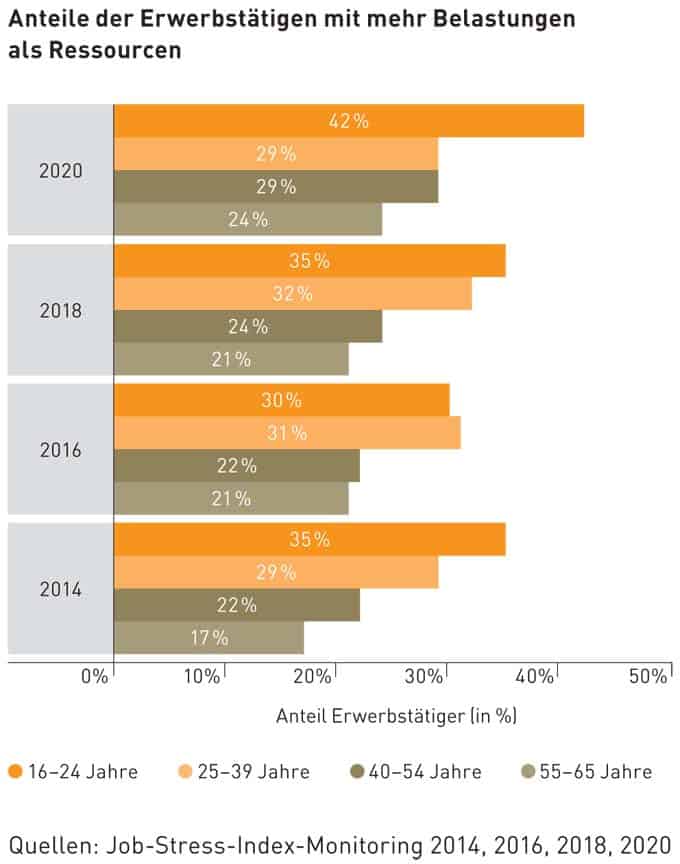Mastering vocational training in good health thanks to BGM
Training apprentices is an investment in the future that should be sustainable. After all, qualified young people from their own ranks are one of the best options for companies to prevent a shortage of skilled workers. This is reason enough to promote the health of young professionals. Here, occupational health management (OHM) can make a targeted contribution to reducing absences, maintaining productivity and increasing the motivation of learners.

Stress in vocational training: According to the Job Stress Index 2020 from Health Promotion Switzerland (see chart), 42% of young workers aged 16-24 have too few resources to meet workplace demands, 30% are emotionally exhausted, and their risk of occupational accidents is twice as high. The pandemic has exacerbated this trend. Health-related productivity losses, which in this age group are a good 21%1) are the economic consequence.

Health promotion in vocational training is urgent
The fact that young workers are increasingly affected by emotional exhaustion is not surprising. After all, they are going through intensive developmental steps that affect almost all areas of life. These are also relevant in the cooperation of the learners with the vocational trainers, superiors as well as teachers in the vocational school. The urgency of specifically promoting the mental health of learners is evident from the aspects and figures mentioned.
At the same time, this increases the demands on those responsible for vocational training. Targeted support offers for the health-promoting management of young employees are therefore welcome. A good point of contact for this are, for example, industry associations, the Association of Vocational Trainers or Apprentice. The latter is a comprehensive range of Health Promotion Switzerland For effective mental health support for learners.
A human and economic gain
Companies in whose culture a systematic BGM is practiced have advantages when it comes to the health-promoting management of learners. Kuhn Rikon AG, for example, introduced a holistic health management system as early as 2006. Since 2009, the company has been awarded the label "Friendly Work Space" certified by Health Promotion Switzerland. The leading cookware manufacturer employs around 190 people in Switzerland. Eleven of them are young employees up to the age of 24, which includes a total of three apprentices in business administration and logistics.
In addition to the usual BGM measures, the company offers its learners individual support, for example:
- Personalized support from recruitment to the final examination, tailored to the specific needs and stage of development.
- The probationary period and interview will take place with the parents.
- The integration of learners into the team. For example, they participate in the monthly Continuous Improvement Process (CIP) meeting.
- The team spirit and the encounter of the apprentices among each other are promoted, e.g. by mutual support with preparation tasks of the inter-company courses or common lunch in the staff restaurant.
- Regular exchange between learners, vocational training officers and supervisors that consciously includes current well-being. This also includes giving the young people sufficient time for their leisure activities.
- An open error culture and appreciative interaction strengthen independent work and thus the learners' awareness of their self-responsibility and self-efficacy.
And this is how health-promoting leadership of learners succeeds. Essentially, three dimensions are decisive here2):
- Self-direction: The vocational trainers promote their own health. They are role models.
- Contact with learners: The vocational trainers promote the health of the learners in direct, communicative exchange (behavior-oriented perspective).
- Design of working conditions: The vocational trainers design the tasks of the learners, their goals and their working environment in such a way that they have a health-promoting effect on the learners (condition-related or relationship-oriented perspective).
1) Source: Health Promotion Switzerland - Job Stress Index Monitoring 2018 according to Galliker et al. 2018b
2) Source: Franke, Vincent & Felfe, 2011
Live chat for vocational trainees
on tobacco consumption - with experts from Addiction Switzerland. January 31, 2022, 1 to 5 p.m. Participate with the FWS Apprentice Experts App.
An event organized by Health Promotion Switzerland.









